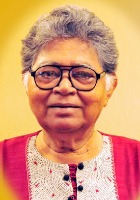Sunil Gangopadhyay Biography
Sunil Gangopadhyay (Shunil Gônggopaddhae), is an Indian poet and novelist.
Early Life
He was born in Faridpur in what is now Bangladesh. He studied at the Surendranath College, Dumdum Motizhil College, City College, Kolkata - all affiliated with the University of Calcutta. Thereafter, he obtained his Master's degree in Bengali from the University of Calcutta in 1954.
Literary Career
He was the founder editor of Krittibas, a seminal poetry magazine started publishing from 1953, that became a platform for a new generation of poets experimenting with many new forms in poetic themes, rhythms, and words. Later, he started writing for various publications of the Ananda Bazar group, a major publishing house in Kolkata and has been continuing it for many years. He became friends with the beat poet Allen Ginsberg while he was traveling in India.
Ginsberg mentioned Gangopadhyay most notedly in his poem September on Jessore Road. Gangopadhyay in return mentioned Ginsberg in some of his prose work. After serving five years as the Vice President, he was elected the President of the Sahitya Akademi on February 20, 2008.
Sunil, along with Tarun Sanyal, Jyotirmoy Datta and Satrajit Dutta had volunteered to be defense witnesses in the famous trial of "Hungryalism" poet Malay Roy Choudhury.
Personal Life
He married Swati Bandopadhyay on February 26, 1967. Their only son, Sauvik was born on November 20, 1967.
Works
Author of well over 200 books, Sunil is a prolific writer who has excelled in different genres but declares poetry to be his "first love". His Nikhilesh and Neera series of poems (some of which have been translated as For You, Neera and Murmur in the Woods) have been extremely popular.
As in poetry, Sunil is known for his unique style in prose. His first novel was 'atmaprakash' and it was also the first writing from a new comer in literature published in the prestigious magazine- 'desh' (1965). It was critically acclaimed but some controversy arises for its aggressive and 'obscene' style. Sunil said that he was afraid of this novel and went away from calcutta for a few days. Satyajit ray, the iconic film-maker thought to make a film on it but it wasn't possible for reasons. The central character of 'Atmaprakash' is a young man of core-calcutta'- sunil, who leads a bohemian life-style. The novel had inspiration from ' On the road' by Jack Kerouac, the beat generation writer. 'Arjun, Pratidwandi, filmed by Satyajit Ray (English title: The Adversary), Aranyer Din-Raatri (The Days and Nights of the Forest, also filmed by Satyajit Ray), Ekaa ebong Koyekjon are some of his well known works of fiction. His historical fiction Sei Somoy (translated into English by Aruna Chakravorty as Those Days) received the Indian Sahitya Akademi award in 1985. Sei Somoy continues to be a best seller more than two decade after its first publication. The same is true for Pratham Alo (also translated recently by Aruna Chakravorty as First Light), another best selling historical fiction and Purbo-Paschim, a raw depiction of the partition and its aftermath seen through the eyes of three generations of Bengalis in West Bengal, Bangladesh and elsewhere. He is also the winner of the Bankim Puraskar (1982), and the Ananda Puraskar (twice, in 1972 and 1989).
Sunil has written (and still writes) in many other genres including travelogues, children's fiction, short stories, features, and essays. Among his pen-names are: Nil Lohit, Sanatan Pathak, and Nil Upadhyay.
Though he has written all types of children's fiction, one character created by him that stands out above the rest, is Kakababu, the crippled adventurist, accompanied by his young adult nephew Santu, and his friend Jojo. Since 1974, Sunil Gangopadhyay has written over 35 novels of this popular series, most of which appeared in Anandamela magazine.
One of Sunil Gangopadhyay's cult poems, Smritir Shohor has been turned into a song for the film Iti Mrinalini (2011) directed by Aparna Sen.
Neera, sometimes, it seems
you are more distant
than even the day I was born.
...
With ease I make a million flowers bloom,
All at once I light up some suns, moons, stars,
In a passing whim I blow out the moonlight
...
This hand has touched Neera's face,
could I use this hand to commit a sin,
ever again?
In the late evening glow
...
This golden figurine- oh dear, will she ceaselessly crumble away,
In the night, in the sun, in the rain in the arms of another man?
Her nipples two bared switches,- switches? Hands tremble at their touch.
...
I once spat into the sea:
no one saw me, no one knew—
The froth of the impassioned waves
swept away my spit.
Yet sometimes I am embarrassed, after so many years I can hear
the sea curse me.
On the mail train's body I once chalked
a woman's profile:
no one saw me, no one knew—
in fact even the stars in her eyes were not there.
Before the train could cross a single station, impassioned rains came—
perhaps my sketch was washed away.
Yet sometimes I am embarrassed, after so many years I can hear
the mail train curse me.
When I walk the road every day, do I trample its heart?
When I catch a woman's nipple with my teeth, am I brutalising her?
Sipping wine on wintry mornings
do I represent an exploitative class interest?
Is it a sin to embrace Saraswati's idol in the first flush of adolescence?
I am still not sure about such things.
Yet I can distinctly hear
the sea and the mail train curse me.
Translated by Pritish Nandy.
...
